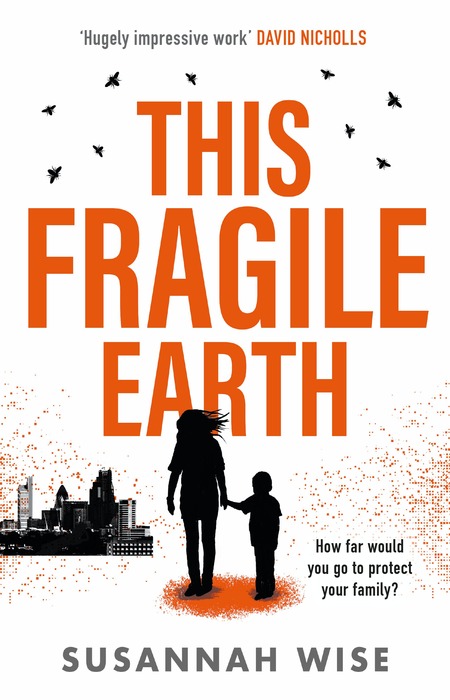With so much of life uncontrollable and intangible, people often place great stock in the fact that the physical world around us has a solidity and permanence to it.
Sure, natural disasters and pandemics can shake that to the core in profoundly traumatic ways at times, something we all have come far too familiar with lately, but by and large, if we can touch it and see it, and that includes the manifestations of civilisation such as roads, electricity, water, power etc (or what they allow us to run or do), we take comfort in the fact that its ongoing presence means it will always be there.
But what if, asks Susannah Wise, in her arrestingly evocative apocalyptic novel, This Fragile Earth, if the world simply stopped working? What would we do then? How would we react?
Would we handle it with capable aplomb, as we imagine in our fevered apocalyptic imaginings – to be fair, who’s going to imagine themselves ballsing up a response to the end of the world? No one, that is; we all want to believe we’d outrun the flood, kill the zombie, slay the aliens – or would we, and this feels like the more human, understandable response, do some clever things, a ton of less than optimal things and muddle through somewhere in the messy middle?
Honestly, Bear Grylls and a thousand other survival specialists aside, we’d pretty much all be an often ineffectual mix of panic, alarm, calmness and rationality; nothing wrong that, it’s just how people react to events way outside of their normal day-to-day understanding of the world and how it works and, we expect with more hope that actuality, will always work.
“She felt her way carefully down the stairs. The halogen street lights were off. Two foxes hollered to each other in the back garden. The house was pitch black. When she looked behind herself, she couldn’t see a thing. She had never experienced darkness like it apart from the weekends at the cottage in Warston. Though the sky there was illuminated by stars, the moon. This city darkness had a heavy, crackled quality to it like black foil.” (P. 21)
The person at the centre of This Fragile Earth is Signy, mother to precious six-year-old son Jed, and husband to Matthew, a man who is the peaceful eye of the storm to Signy’s often tempestuous reactions.
Their marriage has seen far better days but on the eve of the world simply grinding to a civilisation beheading halt, they keep muddling through for Jed, trying to hang onto the romance they once enjoyed but all too aware it’s on its last, barely-functioning legs.
That might’ve been okay, if not ideal, had one day in particular not dawned in which the phones stopped working, water, electricity and gas go the way of the dinosaurs and all the physical concrete certainties around them hadn’t just vanished, pretty much overnight.
As it becomes clear that the government’s assurances that the situation will be resolved soon are as empty as the water pipes in their apartment, Matthew and Signy react in singularly different ways.
While Matthew calmly trudges back from his automated car on the freeway – the story of This Fragile Earth takes place in a climate change-ravaged near-future full of smart robots who do everything from medical diagnosis to farming and where AI is a fact of daily life – and sets off to locate missing friends and get groceries (such as they are in a world rapidly descending into self-protective, mutually-destructive panic), Signy frets about what lies ahead, driven as any mother would be, by what she’ll need to do to protect her son.
When filling up saucepans with water, and texting her old friend Gethin for answers, aren’t enough, Signy becomes determined to escape a rapidly decaying London with troops on the streets, barely any food on the shelves and a sense that humanity is breaking down right along with civilisation they once took for granted.
Matthew isn’t so sure but aware of how much getting to the safety of her childhood village of Warston, about 80 miles out of London, matters to her – she claims it’s to see after the welfare of her mother, which is true to an extent, but largely, it’s to get to somewhere she feels safe, and where, more importantly, she can keep her endlessly inquisitive and wise-beyond-his-years son safe – he agrees that they’ll set the next day, along with the parents of a kid Jed knows from school.
Unfortunately planning anything in a time of cataclysmic destruction, something we know all too wall after the normalcy-busting effects of the pandemic on our daily lives, is fraught with all kinds of peril and as This Fragile Earth progresses in ways tender and tense, protective and violently exposed, all written with real empathy and insight, Signy comes to realise that there is no planning for how other people will handle the end of the world.
“She opened her mouth. A hard, hard silent sound. If she pushed any harder, she’d break herself. The tiniest frequency, unmoored, high, a radio unable to find its wave.
‘Mama.’ Jed tugging at her leg. ‘Mummy. Mama. Mum. Stop making noises, Mama, please.’
‘I’m sorry,’ she said. ‘I’m sorry, little one.’ Jed was crying now. Those big fat round tears he made. ‘I was wrong. There’s nothing for us here. We have to go.’
‘What? Where?’
‘I don’t know. Rugby first. Then another place. We need to find people.’
His face set. ‘No.’
‘Yes, love.'” (P. 224)
Sadly, the end of all things, well, all things people have known to that point, brings out both the best and the worst in people, and for all the people that share food and limited supplies, and who go out of their way to show kindness in a time more suited to callous survivability, there are those who take and pillage and use the disruption to manifest their most base impulses.
Through it all, we witness Signy making smart, well-thought-out decisions and a host of more reactive, hurried ones, and while you sometimes roll your eyes at her panicked responses, the truth is you come to love and understand Signy because she is all of us in the end, doing her best to navigate an unprecedented situation, all to aid the protection of her son, and not always doing it perfectly.
But really, who of would?
Because in the chaotic falling apart of the end times events of This Fragile Earth, doing whatever it takes is pretty much the only option, an all too human reaction which keeps the novel, for all its slow-burning and virulently fast dramatic events, grounded in what it means to be someone trying to stay alive and keep those you love most alive too.
Rich in grounded, resonant humanity, and written with a profound understanding of what it would really be like when the world has broken beyond repair, This Fragile Earth is a brilliantly clever, deeply affecting and superbly well-written novel that takes all the fantasies we might have about triumphing and live our best apocalyptic life at the end of the world, trashes them in the bin and burns them all while asking us what we would be willing to do to stay alive.
It’s powerful, moving stuff, and Signy is the Everywoman we need as a protagonist, imbuing This Fragile Earth with an accessible, relatable honesty, a sense of the darkness always resident at the heart of the human soul always present, but more importantly in a story that is ultimately all about a mother trying to protect her son, about the power of hope and love, the gritty versions of those emotions not the flowery Disney ones, to see us through when everything seems to have left us to the figurative wolves to devour.

